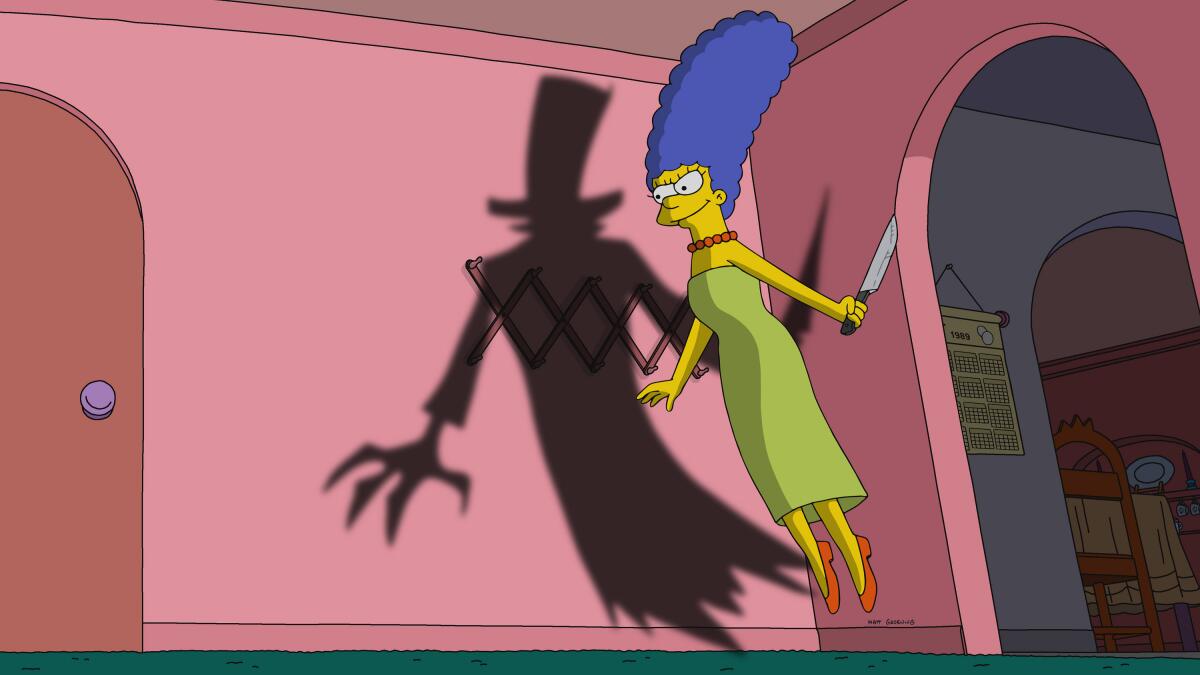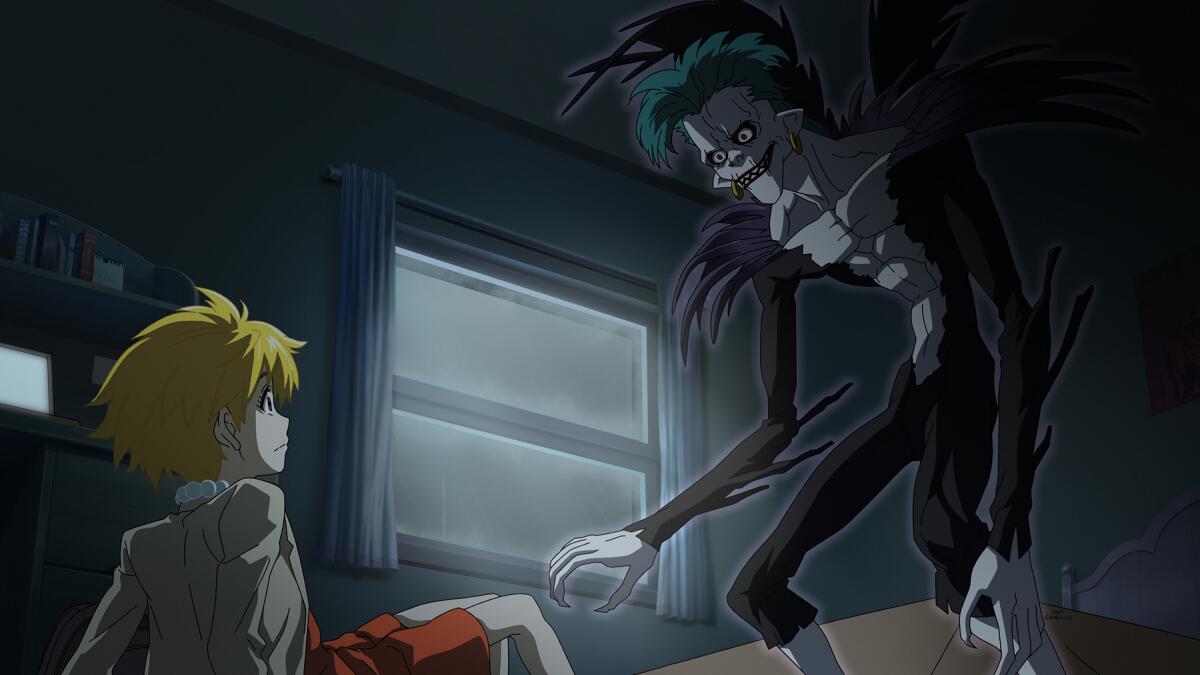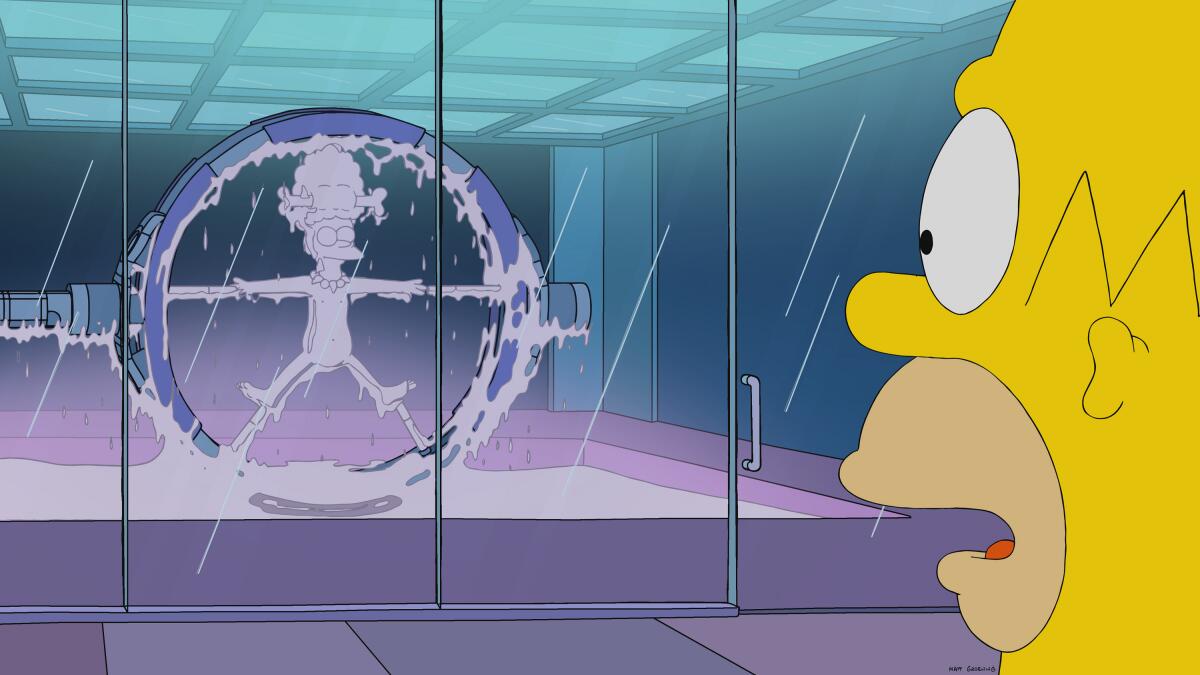The influences behind ‘The Simpsons’ Emmy-nominated scare fest

“The Simpsons’” annual “Treehouse of Horror” outing has become a favorite Halloween staple since the first one arrived in October 1990. Fans have come to expect clever spoofs of popular fantasy, horror and sci-fi films and TV shows in these perfectly calibrated thrill rides.
The Emmy-nominated “Treehouse of Horror XXXIII” from the 34th season of the show featured segments parodying the horror movie “The Babadook,” the anime favorite “Death Note” and sci-fi classic “Westworld.” Written by Caroline Omine (“The Pookadook”), Ryan Koh (“Death Tome”) and Matt Selman (“Simpsons World”), the episode was directed by Rob Oliver, who also helmed the Emmy-nominated “Thanksgiving of Horror” (2019) and the Emmy-winning episode “Mad About the Toy.”
“We knew this was going to be a tremendous episode because the three stories were so well written,” Oliver says. “I don’t like it when we do the ‘Treehouse’ episode just to show blood. To me, that’s not where the comedy is. You need to have really good stories and create great suspense and then add in all the good jokes.”
The director, who has been with the show since its eighth season, says “The Death Tome” segment is a perfect example of how the show strives to reflect the visual style and artistic choices of its subjects. In the segment, Lisa Simpson finds a mysterious book with a sinister power: When someone’s name is written in it, that person will die. It closely follows the premise of “Death Note,” the well-loved anime series based on Tsugumi Ohba and Takeshi Obata’s manga. To help create the animation, the producers reached out to DR Movie, the South Korean studio that assisted with the animation of the original.

“I was struggling to design these characters and making them animatable for us,” recalls Oliver. “I knew that if we were going to animate it ourselves, we’d have to make them a lot simpler than the original ‘Death Note.’ But then, when DR Movie studio came on board, they just charged forward. Caroline Omine did a fantastic job of directing them on how to make our characters into anime. When we saw the results, we all got goose bumps. It wasn’t just our characters in an anime style: It looked like this was really their world!”
Oliver is also proud of the show’s take on Jennifer Kent’s 2014 cult favorite “The Babadook,” which he found quite terrifying. In “The Papadook,” Marge is possessed by a murderous spirit that lives inside a book. “What is scarier than a mother threatening her own helpless baby? We wanted every shot to have a purpose to make this one really sing. There’s a scene where Marge floats over to the basement door to get to Maggie. She climbs up the door and starts kicking it in. We had to make it more terrifying, so we got three dynamic shots of her kicking — bam, bam, bam — and that really shot up the terror. You really felt like she was going to break in there and get Maggie!”

In the third segment, “Simpsons World,” Homer realizes that he and his family are robots in a Disney World-like amusement park. “I was a bit worried that we were going to sell ourselves short, because we had only so much time and so many scenes,” Oliver says. “But in the end, we were able to tell a dense story packed with lots of great nuggets from favorite episodes in the show’s history.”
The story begins with a callback to “Marge vs. the Monorail,” an acclaimed episode from the fourth season. There’s also references to the makeup gun (from “The Wizard of Evergreen Terrace”) and the T-shirt cannon (from “Alone Again, Natura-Diddly”). Viewers can also spot a statue of “Simpsons” creator Matt Groening holding Bart’s hand in the park, just like the one of Walt Disney with Mickey Mouse in Disney parks. The episode finishes with a satisfying twist as it’s revealed that multiple theme parks from other animated shows such as “Bob’s Burgers,” “South Park,” “Futurama,” “Rick and Morty” and “SpongeBob SquarePants.” Oliver says, “The ‘Bob’s Burgers’ reveal was so fantastic, especially since we got the android version of the Linda Belcher character to be voiced by actor John Roberts, who plays her on the show.”
The director says the creative team works hard to come up with fresh ways to entertain audiences, even though “The Simpsons” holds the record for being the longest-running scripted prime-time show on U.S. television. “I love being able to help create these stories with these wonderful characters,” Oliver says with a smile. “Sometimes, I can be at my desk and I just keep laughing as I’m drawing or listening to the lines over and over again. With every episode, I get to learn so many new things. And we get to make people laugh. That’s what I love best about my job.”
More to Read
From the Oscars to the Emmys.
Get the Envelope newsletter for exclusive awards season coverage, behind-the-scenes stories from the Envelope podcast and columnist Glenn Whipp’s must-read analysis.
You may occasionally receive promotional content from the Los Angeles Times.






